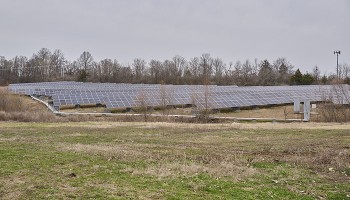The O'Connell administration is committed to supporting equitable, sustainable growth. This means a commitment to improving our residents' quality of life, particularly in disadvantaged communities. It means preserving our city's natural resources, and mitigating our impact on climate change by reducing our greenhouse gas emissions and other wasteful practices. It also means minimizing the negative impacts of the changing climate on our communities, built environment, supportive systems, and economy. On these pages you will find information and resources in three key areas as we work toward these goals.

Sustainability

Resilience

Environment

Take Action
Nashville has taken the important step of establishing several formal targets that set aggressive goals or requirements for climate action and can be used for measuring progress.
- Metro Code 2.32.065 establishes a fleet electrification program overseen by the department of general services and requires that the metro general government fleet transition to 100 percent zero emissions by 2050. Emergency response vehicles are exempted from this program and transition requirement.
- Metro Code 2.32.070 requires the department of general services to develop a strategic energy management plan for reducing energy and water use across metro-owned buildings. The plan should aim to achieve at least 20 percent reductions in average energy and greenhouse gas emissions.
- Metro Code 2.32.080 establishes a renewable energy portfolio standard overseen by the department of general services that requires metro general government operations to source 100 percent of its energy from renewable energy resources by 2040.
- Metro Code 16.60 requires metro government facilities to pursue LEED certification (gold for buildings in the Urban Services District (USD) and silver for buildings outside of the USD) for new construction and additions exceeding five thousand gross square feet of occupied space.
- RS2022-1358 adopts a community-wide and metro government target of an 80 percent reduction in annual greenhouse gas emissions from 2014 levels by 2050 and regular progress reporting.
- RS2023-2393 adopts a community-wide and metro government target of a 50 percent reduction in food waste from 2017 levels by 2030.
Coalitions and Commitments
Sustainability Advisory Committee
In August 2023, Metro Council passed Ordinance BL2023-2004, which amended Title 2 of the Metropolitan Code of Laws to create a Sustainability Advisory Committee to guide Nashville and Davidson County's efforts to increase sustainability and resilience and further community livability and economic competitiveness. This formal establishment reflected the value contributed by the city's previous ad hoc sustainability advisory bodies—convened under the four previous mayors—and the importance of the targets the city has set to date.
Global Covenant of Mayors
In December 2019, Nashville became a signatory to the Global Covenant of Mayors for Climate & Energy, a global coalition of more than 10,000 cities and local governments dedicated to reducing greenhouse gas emissions, making their communities more resilient to the impacts of climate change, and providing access to sustainable energy. Nashville's participation in the Global Covenant of Mayors requires ambitious local climate and energy action and a transition to a low-emission and resilient urban environment to benefit public and environmental health and to lay the foundation for a prosperous economy. To date, Metro Nashville has earned Compliance badges for Mitigation, on the basis of its 2021 Climate Action Plan, and Adaptation, on the basis of its forthcoming 2024 Climate Adaptation and Resilience Plan.
Related News
Contact
-
Kendra Abkowitz
Acting Program Director for Choose How You Move and Senior Director of Sustainability
